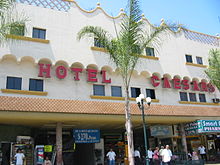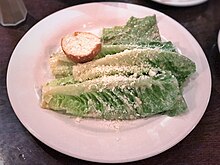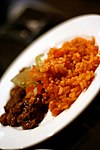This is the current revision of this page, as edited by Alalch E. (talk | contribs) at 10:56, 10 January 2025 (→Health concerns: this is stupid). The present address (URL) is a permanent link to this version.
Revision as of 10:56, 10 January 2025 by Alalch E. (talk | contribs) (→Health concerns: this is stupid)(diff) ← Previous revision | Latest revision (diff) | Newer revision → (diff) Green salad of romaine lettuce and croutons
 | |
| Course | |
|---|---|
| Place of origin | Mexico |
| Region or state | Tijuana, Baja California |
| Created by | Caesar Cardini |
| Invented | 1924 |
| Serving temperature | Chilled or room temperature |
| Main ingredients | Romaine lettuce, croutons, Parmesan cheese, lemon juice, olive oil, egg yolks, Worcestershire sauce, anchovies, (optionally) Dijon mustard, black pepper |
| Variations | Multiple |
A Caesar salad (also spelled Cesar, César and Cesare) is a green salad of romaine lettuce and croutons dressed with lemon juice (or lime juice), olive oil, eggs, Worcestershire sauce, anchovies, garlic, Dijon mustard, Parmesan and black pepper.
The salad was created on July 4, 1924, by Caesar Cardini at Caesar's in Tijuana, Mexico, when the kitchen was overwhelmed and short on ingredients. It was originally prepared tableside, and it is still prepared tableside at the original venue.
History


The salad's creation is generally attributed to the restaurateur Caesar Cardini, an Italian immigrant who operated restaurants in Mexico and the United States. Cardini lived in San Diego, but ran one of his restaurants, Caesar's, in Tijuana, Mexico, to attract American customers seeking to circumvent the restrictions of Prohibition. His daughter, Rosa, recounted that her father invented the salad at the Tijuana restaurant when a Fourth of July rush in 1924 depleted the kitchen's supplies. Cardini made do with what he had, adding the dramatic flair of table-side tossing by the chef. Some other accounts of the history state that Alex Cardini, Caesar Cardini's brother, made the salad, and that the salad was previously named the "Aviator Salad" because it was made for aviators who traveled over during Prohibition. A number of Cardini's staff have also said that they invented the dish. A popular myth attributes its invention to Julius Caesar. A 2024 book confirmed the claim that Caesar Cardini originated the recipe. Livio Santini's son, Aldo, countered that his father provided the recipe while working as a cook in Cardini's restaurant.
The American chef and writer Julia Child said that she had eaten a Caesar salad at Cardini's restaurant in her youth during the 1920s, made with whole romaine lettuce leaves, which were meant to be lifted by the stem and eaten with the fingers, tossed with olive oil, salt, pepper, lemon juice, Worcestershire sauce, coddled eggs, Parmesan, and croutons made with garlic-infused oil. In 1946, the newspaper columnist Dorothy Kilgallen wrote of a Caesar containing anchovies, differing from Cardini's version:
The big food rage in Hollywood—the Caesar salad—will be introduced to New Yorkers by Gilmore's Steak House. It's an intricate concoction that takes ages to prepare and contains (zowie!) lots of garlic, raw or slightly coddled eggs, croutons, romaine, anchovies, parmeasan [sic] cheese, olive oil, vinegar and plenty of black pepper.
In a 1952 interview, Cardini said the salad became well known in 1937, when Manny Wolf, story editor and Paramount Pictures writer's department head, provided the recipe to Hollywood restaurants.
In the 1970s, Child published a recipe in her book From Julia Child's Kitchen, based on an interview with Cardini's daughter, in which the ingredients are tossed one-at-a-time with the lettuce leaves. Cardini's daughter and several other sources have testified that the original recipe used only Worcestershire sauce, not anchovies, mustard, or herbs, which Cardini considered too bold in flavor. Modern recipes typically include anchovies as a key ingredient, and are frequently emulsified or based on mayonnaise.
Dressing
Bottled Caesar dressings are produced and marketed by many companies, including Cardini's, Bolthouse Farms, Ken's Foods, Marzetti, Newman's Own, Panera Bread, Trader Joe's, and Whole Foods Market. The trademark brands, "Cardini's", "Caesar Cardini's" and "The Original Caesar Dressing" are all claimed to date to February 1950, although they were only registered decades later.
Ingredients

Common ingredients in many recipes:
- Romaine lettuce
- olive oil
- crushed garlic
- salt
- Dijon mustard
- black pepper
- lemon juice
- Worcestershire sauce
- anchovies
- whole eggs or egg yolks, raw, poached or coddled
- grated Parmesan cheese
- croutons

Variations include varying the leaf, adding meat such as grilled chicken or bacon, or omitting ingredients such as anchovies and eggs.
While the original Caesar's in Tijuana uses lime juice in their current recipe, most modern recipes use lemon juice or vinegar. Modern chefs sometimes put experimental salads on menus under the "Caesar" even when there is no resemblance to the original recipe. Unrelated variations, called "mutants" and "bastardized" in The Atlantic, use the familiar, appealing name to attract diners to dishes with a similar hit of "umami, fat, and tons of salt."
Vegan versions can replace anchovies with capers and the eggs with tahini.
See also
References
- Burke, David; Choate, Judith (2009). "Caesar salad". David Burke's New American Classics. Knopf Doubleday Publishing Group. p. 67. ISBN 978-0-307-51943-6. Archived from the original on 7 July 2021. Retrieved 12 July 2016.
- "Cesar Cardini, Creator of Salad, Dies at 60". Los Angeles Times. 5 November 1956.
Caesar Cardini, 60, credited with the invention of the Caesar salad, died
- "Rosa Cardini". The Telegraph. 21 September 2003. Archived from the original on 27 March 2019. Retrieved 10 February 2012.
- Ryan, Patrick Spaulding (31 December 2022). "Una Corrida Extraordinaria". SSRN. SSRN 4316277.
- Grant, Dorothy (15 June 2007). "Hail to all fathers, and hail Caesar!". TCPalm. Archived from the original on 8 March 2016. Retrieved 17 December 2020.In , D. Grant quotes Aviator's salad and more (2007)
- "The History of Caesar Salad". Kitchen Project. Archived from the original on 2 July 2007. Retrieved 18 December 2020.
- Birrell, Nicki (4 July 2024). "Caesar Centenary: What's the story behind the famous salad?". The New Zealand Herald. Retrieved 10 July 2024.
- O'Conner, Patricia T; Kellerman, Stewart (2009). Origins of the Specious: Myths and Misconceptions of the English Language. New York: Random House. p. 75. ISBN 978-1-4000-6660-5.
- Poblete, Claudio (12 July 2024). Caesar: La Ensalada Mas Famosa. Larousse. ISBN 978-607-21-2748-7.
- Jinich, Pati (1 July 2024). "The Century-Long Saga of the Caesar Salad". The New York Times. Retrieved 1 December 2024.
- ^ Child, Julia; Child, Paul (1975). From Julia Child's Kitchen. New York: Alfred A. Knopf. pp. 431–433. ISBN 978-0-394-48071-8.
- ^ Kilgallen, Dorothy (2 August 1946). "The Voice of Broadway". The News-Herald (Franklin, Pennsylvania). p. 4. Archived from the original on 2 November 2020. Retrieved 18 December 2020.
- Hawkes, Graham (27 August 2014). "Hail, Caesar's salad". New Zealand: Stuff. Retrieved 13 February 2023.
- "The History of Caesar Salad". kitchenproject.com. Retrieved 13 February 2023.
- ^ Witchel, Alex (7 March 2001). "Great Caesar's Ghost! Where's My Anchovy?". The New York Times. Retrieved 1 October 2022.
- "The Best Caesar salad". Seriouseats.com. Archived from the original on 12 June 2018. Retrieved 30 May 2018.
- Gritzer, Daniel (26 October 2023). "The Best Caesar Salad Dressings | Taste Test". Serious Eats. Retrieved 8 May 2024.
- Denton, Korey (8 February 2023). "12 Best Grocery Store Caesar Dressings, Ranked Worst To Best". Mashed. Retrieved 8 May 2024.
- "Serial numbers 73426710 "Cardini's", registered 1983 by Caesar Cardini Foods". United States Patent and Trademark Office. Archived from the original on 13 July 2021. Retrieved 15 March 2022.
- "Serial numbers 73782270 "The Original Caesar Dressing" and "Caesar Cardini's", registered 1989 by Dolefam Corporation, which later merged with T. Marzetti". United States Patent and Trademark Office. Archived from the original on 13 July 2021. Retrieved 15 March 2022.
- "Caesar Salad". Credo Reference. Encyclopedia of American Foods. Retrieved 30 May 2022.
- Gora, L. Sasha. "The surprising truth about Caesar salad". BBC. Archived from the original on 31 March 2021. Retrieved 23 April 2021.
- Cushing, Ellen (17 April 2024). "Something Weird Is Happening With Caesar Salads". The Atlantic. Retrieved 19 April 2024.
- "Vegan Caesar Salad Recipe". Ambitious Kitchen. Monique Volz. 16 March 2021. Retrieved 9 September 2022.
Further reading
- Greenfield, Terry D. (1996). Lorna Bolkey; Kathryn Hall (eds.). In Search of Caesar: The Ultimate Caesar Salad Book. Alexander Books. ISBN 978-1-57090-014-3.
- Mariani, John F. (1985). The Dictionary of American Food and Drink. Book Sales. ISBN 978-0-89919-199-7.
- Stradley, Linda; Cook, Andra (1997). What's Cooking America. Chehalem Publishing. ISBN 978-1-885221-55-1.
- Trager, James (1995). The Food Chronology: A Food Lover's Compendium of Events and Anecdotes, from Prehistory to the Present. Henry Holt and Company. ISBN 978-0-8050-3389-2.
- Van Dyk, Garritt C. (3 July 2024). "No croutons, no anchovies, no bacon: the 100-year-old Mexican origins of the Caesar salad". The Conversation. Retrieved 28 July 2024.
External links
| Salad dressings | ||
|---|---|---|
| Condiments |  | |
| Types | ||
| Manufacturers | ||
| Mexican cuisine | |||||||||||
|---|---|---|---|---|---|---|---|---|---|---|---|
| List of Mexican dishes | |||||||||||
| Soups and stews | 
 | ||||||||||
| Rice and pasta dishes | |||||||||||
| Bean dishes | |||||||||||
| Egg dishes | |||||||||||
| Vegetable dishes | |||||||||||
| Meat dishes |
| ||||||||||
| Other protein dishes | |||||||||||
| Cheese dishes | |||||||||||
| Antojitos |
| ||||||||||
| Sauces and condiments | |||||||||||
| Desserts and sweets | |||||||||||
| Salads | |||||||||||
| Breads | |||||||||||
| Beverages | |||||||||||
| Variants |
| ||||||||||









